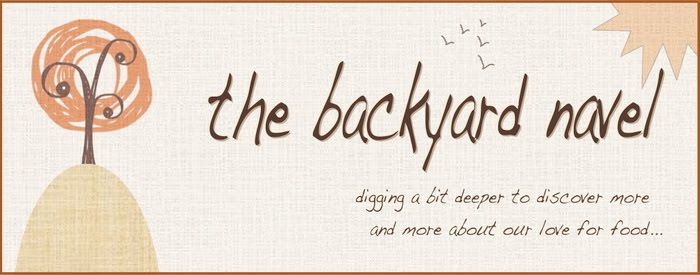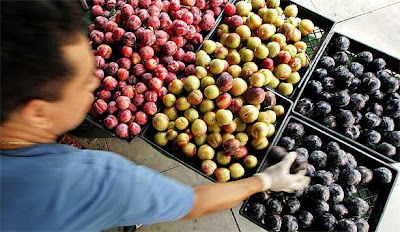 where some might say there are, at this point, too many food shows on television, i'll gladly stand up and argue the counterpoint that no, there really aren't. if you take the phenomenon of the food network, and stand it side by side with a show like "anthony bourdain: no reservations," nothing in the food network's lineup holds a candle to the grit and raw honesty that bourdain broadcasts with. there's a ton to learn from alton brown, and the amateur chef can truly absorb a wealth of knowledge on technique and gastronomic whatnot from emeril lagasse and mario batali, that for the most part had previously been limited to culinary school and restaurant kitchen exclusivity—julia aside—but the network is far too content to just settle with where they'd previously set their own bar.
where some might say there are, at this point, too many food shows on television, i'll gladly stand up and argue the counterpoint that no, there really aren't. if you take the phenomenon of the food network, and stand it side by side with a show like "anthony bourdain: no reservations," nothing in the food network's lineup holds a candle to the grit and raw honesty that bourdain broadcasts with. there's a ton to learn from alton brown, and the amateur chef can truly absorb a wealth of knowledge on technique and gastronomic whatnot from emeril lagasse and mario batali, that for the most part had previously been limited to culinary school and restaurant kitchen exclusivity—julia aside—but the network is far too content to just settle with where they'd previously set their own bar.the food network erupted on the scene not so long ago, and while the going was still to be had, continually raised the bar, capturing talent after talent to help shape the network—which is where they went wrong. it's not talent that programs need to focus on, it's content. based on the advertising during commercial breaks, and the campy, painfully bland humor every single host takes on each of the network's shows, it's painfully obvious that middle america is their target demographic. which makes a heck of a lot of sense profit wise, but worries me in one painful way.
the problem with middle america is that we've settled for complacency, and where, if pushed, we should raise to the challenge of intellectual adversity and change, we're instead sitting on our couches, time passing idly by, because there's just nobody tipping the couch and throwing us off.
that's where my excitement for this piece comes in. though i still can't stand the word and the thought of my having one, this blog, though so small and still such a work in progress, and minute in reach, has somehow turned some heads somewhere—enough so that i received in the mail an exclusive preview to ruth reichl's new wgbh program on pbs, "gourmet's adventures with ruth."
 the title alone foreshadows this show is a) no doubt about food, but also b) not your middle america food network mediocrity. one word comes to mind when i look at the photo above: exotic. this is a show, hosted by a woman known for her triumphs through some of the finest food publications in the country—though a position of envy, one also of seeming safety and relative celebrity—that's going to pull at the roots of food, its cultivation and how it's eaten, and maybe even ask, finally, in what esteem this thing called food is held in parts of the world more than likely unknown to that middle america safety net of the food network.
the title alone foreshadows this show is a) no doubt about food, but also b) not your middle america food network mediocrity. one word comes to mind when i look at the photo above: exotic. this is a show, hosted by a woman known for her triumphs through some of the finest food publications in the country—though a position of envy, one also of seeming safety and relative celebrity—that's going to pull at the roots of food, its cultivation and how it's eaten, and maybe even ask, finally, in what esteem this thing called food is held in parts of the world more than likely unknown to that middle america safety net of the food network.we're talking bourdain, here. we're talking the salt of the earth. grit and gruff and god knows what else. or so i thought going into watching the season's premiere episode.

instead, what i watched was a program that was soft, nurturing even, nestled indeed within the salt of the earth, but minus the vulgarity and uncensored spontaneity, that admittedly i'd fear to subject my grandparents to, of an episode with bourdain.
the show's producers were smart with this first episode, casting its story in the tennessee foothills of the smoky mountains on the self-sustained grounds of blackberry farm. the episode was country. very country. with magnificent shots of bright green tree canopy and the call of roosters in the background, aided by the bluegrass duet of softly strummed strings, the tertiary elements of the farm played right into what i foresee the show is out to accomplish: an attempt to learn, and in return exploit, the truths that have somehow been forgotten about the way we eat and why, despite the increased ease and affordability to do differently, we need to invest far more trust and faith in the farmer and his cultivation of our foods.
in its element, the show is structured well. the actress frances mcdormand tags along side with ruth for the episode, and together they harvest the foods they then prepare with the farm's proprietor, sam beall. frances is a familiar face, and a safe one, too. she's funny and smart, and out of character, though donned in overalls, seemingly fits right in to the whole way of country living—which is further exploited when the two women give fly fishing a shot, and frances seems to naturally hone in, her face locked and concentrated on the natural methodicalness of the catch, while ruth repeatedly sticks her lure in the branches above the stream. it's not hilarious, but it's not campy neither. it's an honest example of just how far removed we've come from sustainable living, ruth a product of new york city—though when it comes to filleting the trout for dinner, the roles reverse and ruth comes off as the pro, and frances the rookie.
here's a teaser to give you an idea of the show:
will this show capture an audience like "no reservations" has? probably not. it just doesn't have the balls out machismo that embodies who anthony bourdain is. but, like i said earlier, i'd fear subjecting my grandparents to his show, yet i very much encourage not only friends and followers alike, but my family and all generations thus encompassed, to truly consider what's happened to our food and the way we eat it. and this is a show i'd hands-down-in-a-heartbeat pass along to my grandparents. it's safe and solitary, yet manages to pose a challenge of its viewer to rise to the occasion of its subject matter. and there's no reason this show can't capture its own audience, perhaps composed in part by those who meddle with bourdain, but so too one would hope of that middle america heartbeat that's the true target for progressive change in agriculture and food systems.
it wasn't so long ago that it was common to find things like possum and squirell and wild greens picked from the forest floor on dinner tables in the south, and so too oysters harvested from the shores of manhattan and the chewy cuts of conch in abundance on plates in florida. ruth picks up on that vein when in the episode she eats a cut of lamb she's never had before—its neck—which is baffling given the positions she's held, and so too admits, with such a trained palette, that she has no idea what a salad of sugar snap peas, cheese curds, mint, and black walnuts will taste like. that's encouraging given the vast separation that's grown between foodies and everyone else, and allows, i would think, a friendly invite for those maybe off put by the pretense and elitism of gourmet and "fancy" foods, especially things specific to a region or even eaten of necessity, as the offal of an animal once was, and in some places even still is.
ruth hits on the self-sufficiency of the farm and how it's a way of looking at both the past and future, "the way we really want to cook." i'm not suggesting we all pack up and leave the city, because the cities are only growing larger. but we all need to open our minds just a bit more. we need to take a look back to the generations before us and understand how they got by, and as i've said before, ask what might be gained from a sustained economy that thrives greatly on locally cultivated agriculture? indeed, it's happening in cities like chicago and boston and new york already, but how can we build on this, rather than celebrate a modest and minute accomplishment—in effect, how might we refuse to repeat where others have failed? how might we toss complacency off the bus? because, in actuality, that bar needs to be raised far, far higher.
and here's a look at the season beyond its initial episode:






































